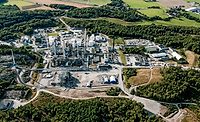Vulcan and BASF Partner to Reduce Emissions

Image courtesy of BASF SE.
Vulcan and BASF have signed a memorandum of understanding to explore the use of geothermal energy at the chemical company’s Ludwigshafen site. The partnership will focus on the potential for geothermal energy to supply BASF’s largest site with renewable energy. The partners will also evaluate the possibility of using geothermal energy to supply the surrounding urban centers of Frankenthal and Ludwigshafen with sustainable heat.
The partnership is part of a broader effort to reduce BASF’s reliance on fossil fuels and lower the company’s carbon footprint. The Ludwigshafen site is BASF’s largest production facility and a major source of the company’s greenhouse gas emissions. By tapping into the region’s geothermal potential, BASF aims to reduce its emissions and transition to a more sustainable energy mix.
In addition to its potential for renewable heat, the Upper Rhine Graben is also home to significant geothermal resources. The region’s geology makes it an ideal location for geothermal energy production, with the potential to generate up to 300 megawatts of thermal energy. If successful, the partnership could help BASF meet its long-term goal of achieving net-zero emissions by 2050.
The partnership will also explore the potential for Vulcan to build a lithium extraction plant at the Ludwigshafen site. The company is already developing a lithium extraction project in the Upper Rhine Graben, which is home to one of the largest lithium deposits in Europe. By co-locating the lithium extraction plant with the geothermal energy project, Vulcan aims to create a more sustainable and cost-effective supply chain for the production of green lithium.
The partnership between Vulcan and BASF is still in the early stages, with the two companies now working to conduct the necessary seismic surveys and other exploratory work. If the initial exploration is successful, the partners will then move forward with the development of a detailed project plan.
In addition to its potential environmental benefits, the partnership is also expected to create new economic opportunities for the region. The development of a local geothermal energy industry could help to create new jobs and support the growth of the region’s clean energy sector.
Source: This article was edited by AI with human oversight.
Looking for a reprint of this article?
From high-res PDFs to custom plaques, order your copy today!







